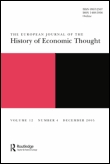
European Journal of the History of Economic Thought
metrics 2024
Connecting Past Insights to Present Economic Paradigms
Introduction
The European Journal of the History of Economic Thought, published by Routledge Journals, Taylor & Francis Ltd, stands as a pivotal platform for scholars in the interdisciplinary fields of economics, history, and philosophy. With its ISSN 0967-2567 and E-ISSN 1469-5936, this esteemed journal is not only recognized for its Q2 ranking in various categories, including Arts and Humanities and Economics, but it also boasts an impressive HIndex indicating a significant level of academic influence and engagement. With published works spanning from 1993 to 2024, this journal seeks to illuminate the historical context and evolution of economic thought, promoting critical discourse among researchers, professionals, and students alike. Although it does not currently offer open access, the journal remains a crucial resource for those wishing to delve into the intricate relationships between economic theory and historical progression. By fostering a deeper understanding of economic ideas and their implications, the European Journal of the History of Economic Thought plays a vital role in enhancing the scholarship within its domain.
Metrics 2024
 0.34
0.34 0.60
0.60 0.70
0.70 26
26Metrics History
Rank 2024
Scopus
IF (Web Of Science)
JCI (Web Of Science)
Quartile History
Similar Journals

Review of Austrian Economics
Fostering critical analysis in contemporary economic issues.Review of Austrian Economics, published by Springer, is a distinguished scholarly journal that plays a pivotal role in the field of economics, particularly focusing on the Austrian School of economic thought. With a rich history spanning from 1987 to 1997 and resuming in 1999 to the present, this journal provides a platform for rigorous research and critical analysis in both theoretical and applied economics. Holding an impressive Q2 classification in 2023, it ranks 124 out of 288 in the General Economics, Econometrics and Finance category, indicating its robust impact within the academic community. Researchers, professionals, and students can benefit from an array of interdisciplinary approaches featured in its articles, which address contemporary economic issues through the lens of Austrian theory. Although not an open-access journal, it continues to foster invaluable discourse that contributes significantly to the advancement of economic thought and policy debates.

History of Economics Review
Bridging Past Insights with Future EconomiesHistory of Economics Review, published by TAYLOR & FRANCIS LTD, is a preeminent journal dedicated to exploring the rich tapestry of economic thought and its historical evolution. With an ISSN of 1037-0196 and E-ISSN 1838-6318, this journal serves as a vital platform for scholars, researchers, and students to disseminate and engage with pivotal economic ideas, debates, and methodologies from historical perspectives. While the journal is not open access, it maintains rigorous peer-review standards, ensuring high-quality research outputs that contribute to the understanding and development of economics as a discipline. The History of Economics Review aims to bridge gaps in economic literature by providing insights into the origins and implications of current economic theories, making it an indispensable resource for those interested in the intersection of history and economics. Situated in the heart of academic publishing, the journal stands as a testament to the enduring importance of historical context in shaping economic discourse.

BUSINESS HISTORY REVIEW
Advancing Knowledge Through the Lens of Business History.Business History Review is a prestigious academic journal published by Cambridge University Press that has been at the forefront of historical scholarship in business since its inception in 1926. With a strong emphasis on interdisciplinary research, it covers a wide range of topics within the field of business history, making it an essential resource for researchers, professionals, and students interested in understanding the historical contexts that shape contemporary business practices. The journal is recognized for its high scholarly impact, featuring a Q1 ranking in History and Q2 rankings in both Business and International Management and Business, Management and Accounting (miscellaneous) categories. Although not an open-access publication, it offers significant insights and groundbreaking research for its audience. With a commitment to promoting a deeper understanding of business's past, Business History Review remains a vital publication for those seeking to connect historical analysis with modern business challenges.
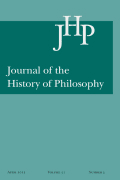
JOURNAL OF THE HISTORY OF PHILOSOPHY
Exploring the Depths of Philosophical HistoryJOURNAL OF THE HISTORY OF PHILOSOPHY is a premier academic journal dedicated to advancing the study of philosophical thought from antiquity to modernity. Published by Johns Hopkins University Press, this esteemed journal features a range of scholarly articles that delve into the historical context, development, and impact of philosophy across civilizations. With an ISSN of 0022-5053 and an E-ISSN of 1538-4586, it boasts an impressive rank of Q1 in Philosophy as of 2023, recognizing its influence and contribution to the field. The journal, which has been publishing since 1975, offers insights that are invaluable for researchers, professionals, and students dedicated to the exploration of philosophical traditions and their legacies. Although it operates under a subscription model, the rigor and depth of the research published make it an essential resource for anyone interested in philosophical inquiry. With its commitment to scholarly excellence and critical discourse, the JOURNAL OF THE HISTORY OF PHILOSOPHY serves as a vital platform for new ideas and connections in the realm of philosophy.

History of Economic Thought and Policy
Unraveling Economic Ideas Through TimeHistory of Economic Thought and Policy is a vital journal published by FRANCO ANGELI, dedicated to exploring the intersections of economic theory, historical context, and public policy. With ISSN 2240-9971 and E-ISSN 2280-188X, this journal serves as an essential platform for scholars interested in the evolution of economic ideas and their implications for contemporary policy-making. Operating from Italy, it has established a comprehensive framework for interdisciplinary research in the fields of Economics and Econometrics, History, and Public Administration, although it currently holds a Q4 ranking in these categories according to 2023 metrics. The journal already encompasses multiple converging years from 2018 to 2024, underscoring its commitment to timely contributions to economic discourse. It aims to provide open access to its content, fostering a collaborative environment for researchers, professionals, and students keen on enhancing their understanding of economic thought throughout history. Despite its current challenges in Scopus rankings, with notable positions in arts, humanities, and social sciences, History of Economic Thought and Policy remains a promising outlet for significant and critical discussions surrounding the historical pathways that shape today’s economic policies.

CAMBRIDGE JOURNAL OF ECONOMICS
Illuminating the Path of Economic UnderstandingCambridge Journal of Economics, published by Oxford University Press, is a premier academic journal in the field of economic theory, policy, and applications, catering to researchers, professionals, and students alike. With a rich history dating back to 1977, this journal has established itself as a notable contributor to critical discourse in the arena of Economics and Econometrics. With an impressive Scopus ranking of #210 out of 716 in its category, placing it in the 70th percentile, the journal maintains a solid Q2 classification, reflecting its significant impact and contribution to the field. Although it operates on a subscription basis, the Cambridge Journal of Economics is accessible through a range of academic databases and libraries, ensuring that its high-quality research reaches a wide audience. The journal aims to advance the understanding and application of economic principles, making it an essential resource for anyone looking to deepen their knowledge or stay updated with the latest research trends in economics.
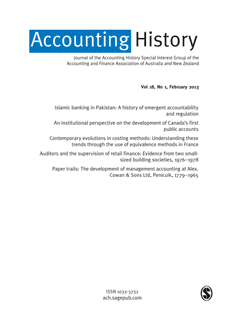
Accounting History
Discovering the Roots of Accounting's Modern PracticesAccounting History, published by SAGE Publications Ltd, is a distinguished journal that has been at the forefront of scholarly discourse since its inception in 1996. With its ISSN 1032-3732 and E-ISSN 1749-3374, it serves as a crucial platform for researchers and practitioners interested in the intersection of accounting practices and historical contexts. The journal holds impressive rankings, notably placing in the Q2 category in Accounting and Q1 in History as of 2023, underscoring its significance in both the fields of accounting and historical research. Its Scopus rankings further reinforce its impact within the academic community, achieving a remarkable 95th percentile in the History category and a respectable 37th percentile in Accounting. Despite not being an open-access journal, it provides invaluable insights through rigorous peer-reviewed articles that explore historical accounting practices and their implications for contemporary issues. With a commitment to fostering a deep understanding of the evolution of accounting, Accounting History continues to be an essential resource for scholars, professionals, and students alike, eager to explore the rich narrative of accounting's past and its relevance today.

HISTORY OF EUROPEAN IDEAS
Deciphering the Legacy of European IdeasHISTORY OF EUROPEAN IDEAS, published by Routledge Journals, Taylor & Francis Ltd, stands as a premier platform for the exploration and dissemination of scholarly research within the fields of history, philosophy, sociology, and political science. With an ISSN of 0191-6599 and E-ISSN of 1873-541X, the journal has established itself in the academic community as a Q1 journal in both History and Philosophy and Q2 in Sociology and Political Science as of 2023. Its rigorous publication standards contribute to its notable Scopus rankings, reinforcing its importance in the humanities and social sciences. Spanning from 1980 to 2024, the journal invites contributions that delve into the intricate interrelations of European ideas and their historical contexts, thus aiming to enrich academic discourse and advance knowledge in these disciplines. Although not available as Open Access, the journal’s curated content remains pivotal for researchers, professionals, and students seeking in-depth analyses and innovative perspectives on European thought.
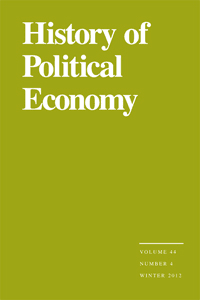
HISTORY OF POLITICAL ECONOMY
Advancing Scholarship at the Convergence of Politics and EconomyHISTORY OF POLITICAL ECONOMY, published by DUKE UNIVERSITY PRESS, stands as a premier journal in the interdisciplinary fields of political economy and history. With an ISSN of 0018-2702 and an E-ISSN of 1527-1919, the journal provides a platform for rigorous scholarship that spans from its converged years beginning in 1986 to the present, aiming to elucidate the complex interplay between economic policies and historical contexts. It holds impressive rankings, peaking in the Q1 category for History and Q2 in Economics and Econometrics as of 2023, showcasing its impact and prestige in the scholarly community. Notably, it is ranked within the 88th percentile in Arts and Humanities History and maintains a significant presence in the 24th percentile for Economics and Econometrics. Although it does not currently offer open access, the journal remains committed to advancing knowledge and fostering thoughtful discourse among researchers, professionals, and students alike. Located in Durham, NC, the journal is dedicated to exploring the rich historical narratives that have shaped economic thought and policy, making it an essential read for those seeking to navigate the intricate landscape of political economy.
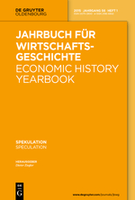
Jahrbuch Fur Wirtschaftsgeschichte
Advancing Knowledge in Economic HistoryJahrbuch Für Wirtschaftsgeschichte is a distinguished scholarly journal dedicated to the field of economic history, published by Walter De Gruyter GmbH. Since its establishment, the journal has provided an invaluable platform for researchers and scholars to publish high-quality research that explores the intricate linkages between historical events and economic developments. With its transition to Open Access since 2022, the journal has enhanced accessibility, allowing a wider audience to engage with significant contributions in the domain. Operating from Germany, the journal has a rich history covering articles from 1960 to 1996 and again from 1999 to 2024. In the 2023 rankings, it holds a Q4 quartile in Economics and Econometrics and a Q2 quartile in History, indicating its growing importance and recognition in the respective fields. With its current ranks of #949 in Arts and Humanities (History) and #686 in Economics and Econometrics, the journal serves as a vital resource for scholars looking to delve into historical economic analysis and its implications for contemporary studies.